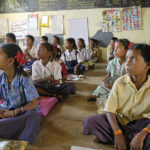 “About a hundred years ago a great son of India, Gopal Krishna Gokhale, urged the Imperial Legislative Assembly to confer on the Indian people the Right to Education. About ninety years later the Constitution of India was amended to enshrine the Right to Education as a fundamental right. Today, our Government comes before you to redeem the pledge of giving all our children the right to elementary education. The Right of Children to Free and Compulsory Education Act, enacted by Parliament in August 2009, has come into force today.” – P.M. Manmohan Singh, Address to the Nation, April 1, 2010.
“About a hundred years ago a great son of India, Gopal Krishna Gokhale, urged the Imperial Legislative Assembly to confer on the Indian people the Right to Education. About ninety years later the Constitution of India was amended to enshrine the Right to Education as a fundamental right. Today, our Government comes before you to redeem the pledge of giving all our children the right to elementary education. The Right of Children to Free and Compulsory Education Act, enacted by Parliament in August 2009, has come into force today.” – P.M. Manmohan Singh, Address to the Nation, April 1, 2010.
The Right of Children to Free and Compulsory Education Act comes into force in India on April 1, 2010. Education is henceforth a fundamental right for all children aged between six and 14 in India. This is the first time that a Fundamental Right has been added to the Constitution of India since its promulgation in 1950. The Act seeks to make several changes in the country’s elementary education system. The concept of neighborhood schools and 25 percent reservation for children from weaker sections in Class I of all private schools are some encouraging steps. Effort is also being made for improving the quality of education by regulating student-teacher ratio and imparting requisite training to teachers.
The law will benefit close to one crore children who do not go to school at present, but its implementation is will be challenging for the Government. The government will have to appoint 12 lakh teachers within six months and these teachers will have to be trained within the next five years. The Centre and the States have agreed to share the financial burden in the ratio of 55:45, while the Finance Commission has given Rs. 25,000 crore to the States for implementing the Act. The Centre has approved an outlay of Rs.15,000 crore for 2010-2011.
Irrespective of the challenges and criticisms, this law allows every child in India, between the age of six and fourteen, to ask the State to provide him/her the right to receive education; grand achievement for a country where vast majority of parents in the lower income group cannot afford primary and elementary education for their children.
Union Human Resource Development Minister Kapil Sibal rightly stated that, “But to think that we have passed a law and all children will get educated is not right. What we have done is preparing a framework to get quality education. It is for the entire community to contribute and participate in this national endeavor,”